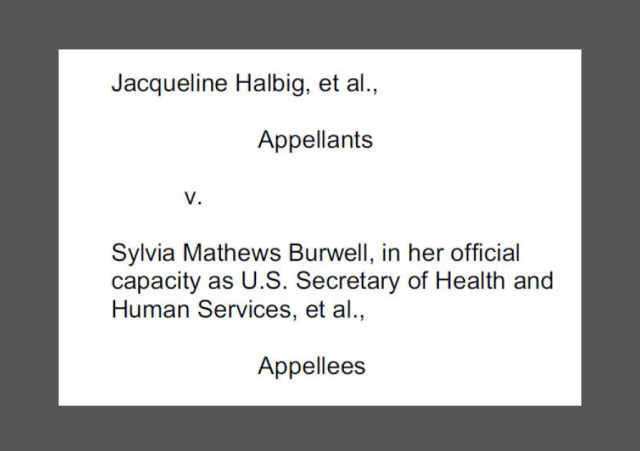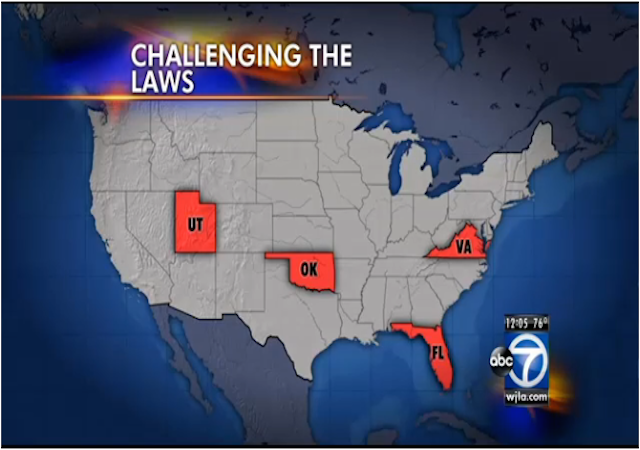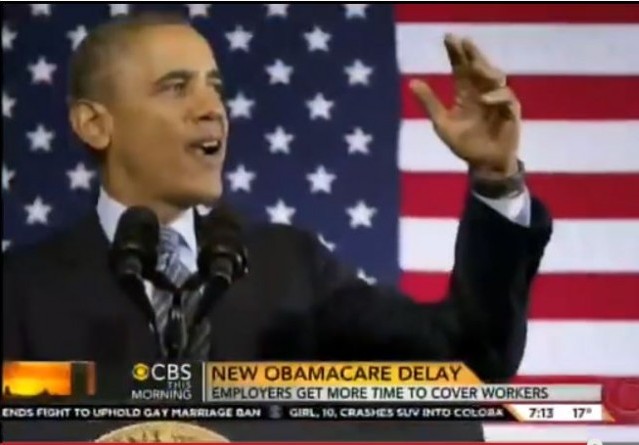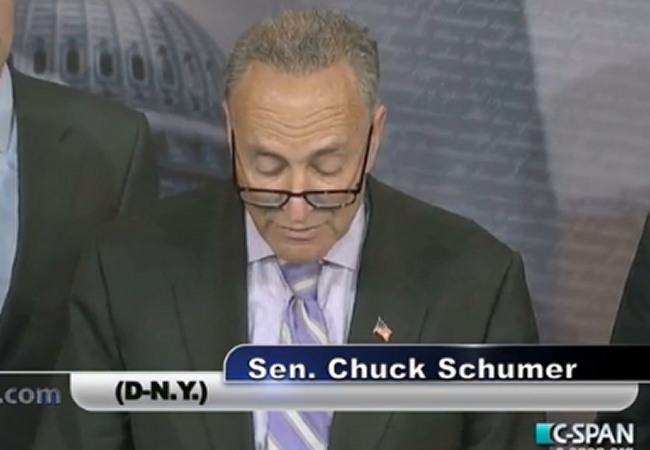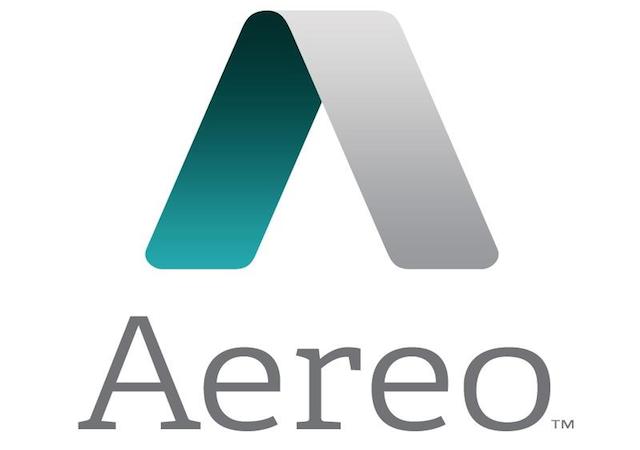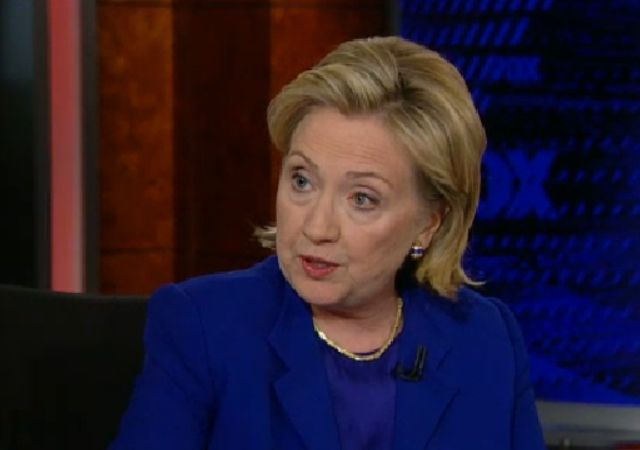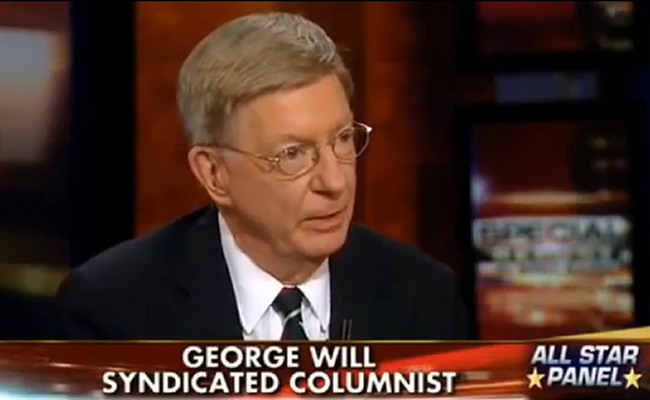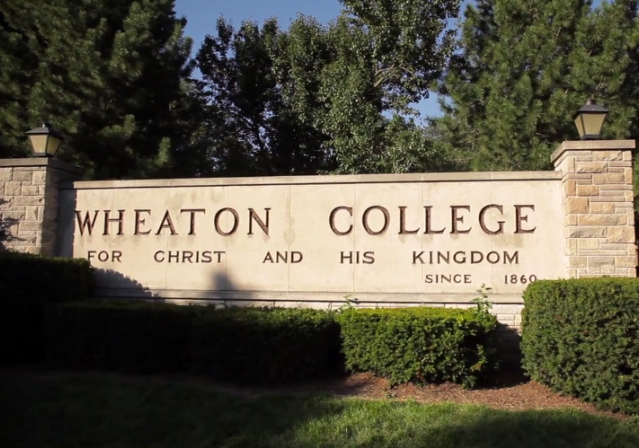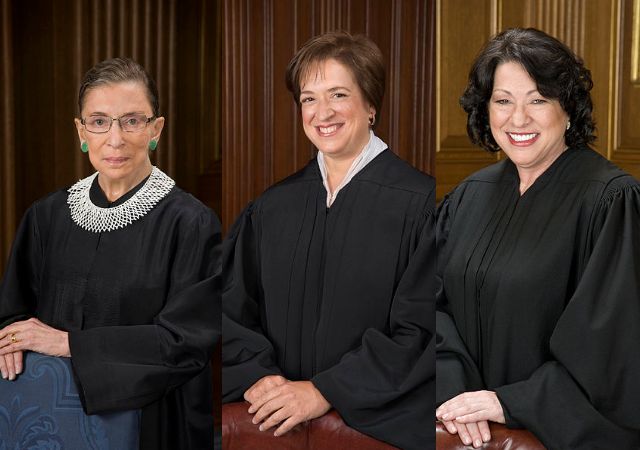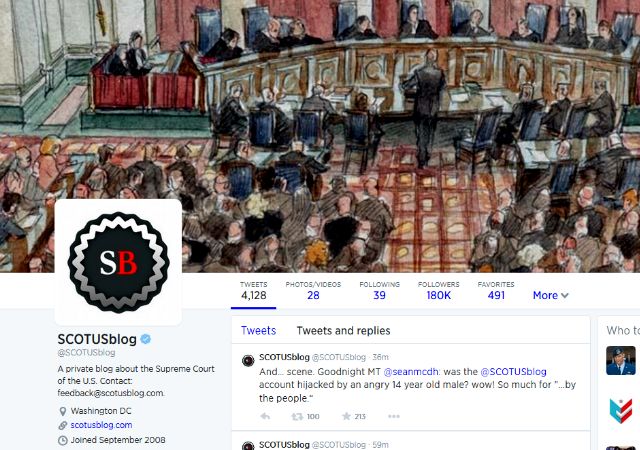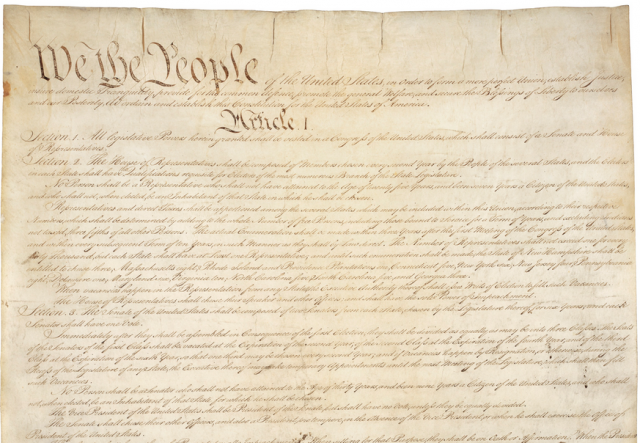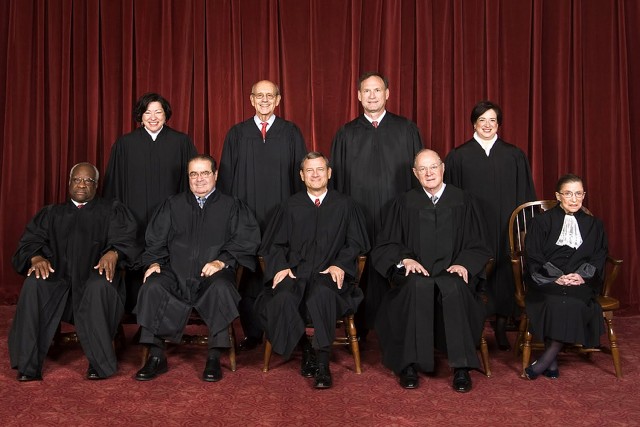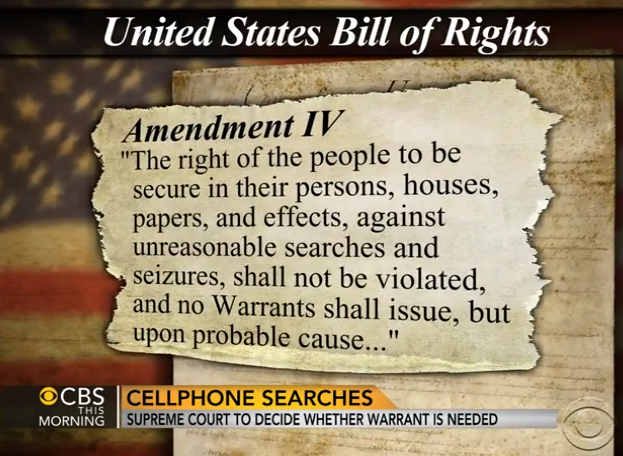US Supreme Court Tag
SCOTUS blocks same sex marriage in Virginia
While nearly all federal and state courts have ruled in favor of same-sex marriage since the high court issued two landmark decisions in June 2013, judges have blocked nearly all such marriages while the cases are appealed. The justices had stepped in once before, in Utah, to do just that. If the court declines to hear the Virginia appeal, the stay would be lifted and couples could begin getting married. Otherwise, those marriages would have to wait until the case is ultimately decided. "The Supreme Court is making clear, as it already did in the Utah marriage case, that it believes a dignified process is better than disorder," said Byron Babione, senior counsel at Alliance Defending Freedom, which represents the Virginia court clerk opposed to same-sex marriage.Virginia Attorney General Mike Herring, who has decided not to support the new ban, actually asked the Supreme Court to issue a stay on the Fourth Circuit's ruling, citing concerns over the impact an eventual negative ruling could have on families and businesses.
law·less·ness, noun
"uncontrolled by a law; unbridled; unruly; unrestrained"...
So if Hobby Lobby were unincorporated, Chuck Schumer would be okay with its contraceptive policy?
Democrats exalt form over substance in attacking religious liberties of owners of closely held corporations....
Aereo’s Last Stand
To operate as a cable company, Aereo would have to get and pay fees for a compulsory copyright license, which gives permission to transmit broadcast channels. Then the startup would have to negotiate with broadcast companies over retransmission fees, which are paid to broadcasters for the right to air their content. This would almost guarantee that Aereo would have to charge customers more to gain access to programming, said Neil Begley, an analyst at Moody’s Investors Service. For one, Aereo would most likely have to buy entire channel bundles to gain access to broadcast channels, he said. Content companies haven’t been keen on selling the rights to transmit individual channels to cable companies, instead favoring bundling offerings like Walt Disney Co. (DIS)’s ABC broadcast network with ESPN. Companies like Apple Inc. (AAPL) have tried and failed to persuade cable networks to let it sell their channels a la carte.The beauty of Aereo is that its streaming service provided basic channels at an extremely low cost--$8 per month, versus $70-$80 per month with a mainstream subscription service like those offered by major cable companies. Aereo's selection was limited, but at under $10 per month, it was a good option for subscribers who weren't interested in scrolling through 300 channels. Last month, the Supreme Court ruled that Aereo's streaming service violated copyright law because the near-real time delivery of the television show amounted to a public performance of private material. (Aereo had previously claimed that they were merely "equipment providers," and were thus exempt from paying for copyright licenses and retransmission of the copyrighted material.) Now, lawyers on both sides are scrambling to respond to the Supreme Court's ruling:
Hillary Clinton’s Big Lie about Hobby Lobby
It’s very troubling that a salesclerk at Hobby Lobby who needs contraception, which is pretty expensive, is not going to get that service through her employer’s health care plan because her employer doesn’t think she should be using contraception.Politifact rates Clinton's statement as Mostly False. The WaPo's fact-checker gave it 2 Pinocchios. But although both articles say Clinton is dissembling to a certain extent, they both give Clinton's statement a more generous interpretation than it deserves, with the WaPo even insinuating that her error might have been inadvertent. Absurd; as I said, Clinton is a razor-sharp lawyer when she wants to be. She should have gotten the maximum number of Pinocchios and then some.
Hobby Lobby beats the Bullies
The Supreme Court reins in government bulliesTwo 5 to 4 decisions this week, on the final decision day of the Supreme Court’s term, dealt with issues that illustrate the legal consequences of political tactics by today’s progressives. One case demonstrated how progressivism’s achievement, the regulatory state, manufactures social strife and can do so in ways politically useful to progressives. The other case arose from government coercion used to conscript unwilling citizens into funding the progressives’ party.
Under the 1993 Religious Freedom Restoration Act (RFRA), any government action that substantially burdens religious practices will be subject to strict judicial scrutiny to determine if it, rather than some less intrusive measure, is necessary to achieve a compelling government interest. The Affordable Care Act, as supplemented by regulations, requires for-profit employers to provide health-care coverage that includes all 20 Food and Drug Administration-approved birth control methods.
These include four that prevent a fertilized egg from being implanted in the uterus. Some persons consider this tantamount to abortion and oppose these abortifacients for religious reasons. Why did Congress, having enacted RFRA, write this clearly incompatible birth control mandate? Congress didn’t.
Read the entire column here.
Meanwhile, the Obama administration is scrambling to find a way to work around the Hobby Lobby ruling.Supreme Court crafts injunction protecting Wheaton College out of Hobby Lobby whole cloth
The application for an injunction having been submitted to JUSTICE KAGAN and by her referred to the Court, the Court orders: If the applicant informs the Secretary of Health and Human Services in writing that it is a nonprofit organization that holds itself out as religious and has religious objections to providing coverage for contraceptive services, the respondents are enjoined from enforcing against the applicant the challenged provisions of the Patient Protection and Affordable Care Act and related regulations pending final disposition of appellate review. To meet the condition for injunction pending appeal, the applicant need not use the form prescribed by the Government, EBSA Form 700, and need not send copies to health insurance issuers or third-party administrators.Note that this really is not substantive, it's a matter of paperwork, as AP explains:
A divided Supreme Court on Thursday allowed, at least for now, an evangelical college in Illinois that objects to paying for contraceptives in its health plan to avoid filling out a government document that the college says would violate its religious beliefs. The justices said that Wheaton College does not have to fill out the contested form while its case is on appeal but can instead write the Department of Health and Human Services declaring that it is a religious nonprofit organization and making its objection to emergency contraception. The college does provide coverage for other birth control. Justices Ruth Bader Ginsburg, Elena Kagan and Sonia Sotomayor said they would have denied Wheaton's request and made the college fill out a form that enables their insurers or third-party administrators to take on the responsibility of paying for the birth control.Yes, heads exploding:
Should female Supreme Court Justices think with their uteri?
How did the Supreme Court manage to agree unanimously that police must obtain a warrant before searching cellphones, yet split on whether employers must offer contraception as part of their health care plans? My explanation, slightly crude but perhaps compelling: All the justices, presumably, have cellphones. Only three have uteruses, and you know which way they voted.This is hardly an isolated idea. It was inherent in Sotomayor's statements about the superior judgment of a "wise Latina":
And [Sotomayor] often said that she hoped those experiences would help her reach better judicial conclusions than someone without such a varied background might reach. The line was almost identical every time: "I would hope that a wise Latina woman with the richness of her experiences would, more often than not, reach a better conclusion." That sentence, or a similar one, has appeared in speeches Sotomayor delivered in 1994, 1999, 2002, 2004 and 2001. In that speech, she included the phrase "than a white male who hasn't lived that life" at the end, which sparked cries of racism from some Republicans.A similar notion about the superiority and importance of membership in a minority or other group officially designated as oppressed was strongly suggested in an execrable comment by Harry Reid (is there any other kind?) in connection with Hobby Lobby, about which I wrote:
@SCOTUSblog trolls confused haters on Twitter
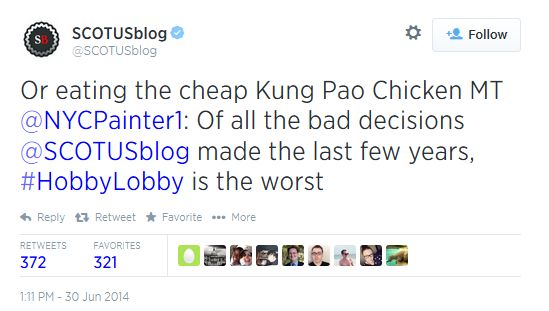
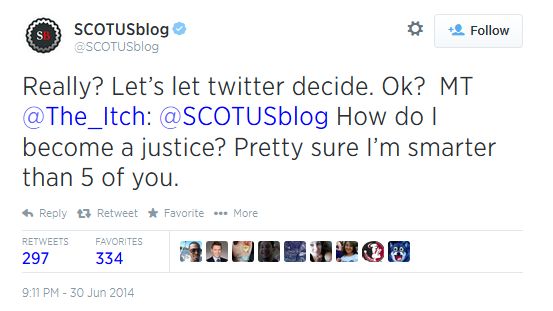
The really old Constitution had a pretty good month
And the Bill of Rights, too....
Hobby Lobby wins in 5-4 decision over Obamacare contraception mandate
No contraception mandate for closely held corporations....
Supreme Court limits compelled public sector union dues
(1) Whether a state may, consistent with the First and Fourteenth Amendments to the United States Constitution, compel personal care providers to accept and financially support a private organization as their exclusive representative to petition the state for greater reimbursements from its Medicaid programs; and (2) whether the lower court erred in holding that the claims of providers in the Home Based Support Services Program are not ripe for judicial review.The ruling was 5-4, with the majority authored by Justice Alito, as tweeted by ScotusBlog:
Breaking: SCOTUS limits power to compel contributions to public employee unions but does not forbid it
— SCOTUSblog (@SCOTUSblog) June 30, 2014The decision says that union bargaining fees cannot be imposed on employees that are not full public employees
— SCOTUSblog (@SCOTUSblog) June 30, 2014This case presents the question whether the First Amendment permits a State to compel personal care providers to subsidize speech on matters of public concern by a union that they do not wish to join or support. We hold that it does not, and we therefore reverse the judgment of the Court of Appeals.
SCOTUS: Your NLRB Recess Appointments are Invalid, Mr. President
The Supreme Court has unanimously ruled that President Obama's recess appointments to the NLRB are invalid....
Supreme Court Unanimously Strikes Down Free Speech “Buffer Zones”
First Amendment upheld against Massachusetts law involving abortion clinic protests...
SCOTUS: Aereo Streaming Service Violates Copyright Law
SCOTUS Is Unanimous: Warrants Needed for Cellphones
By a 9-0 vote, the justices said smart phones and other electronic devices were not in the same category as wallets, briefcases, and vehicles -- all currently subject to limited initial examination by law enforcement. Generally such searches are permitted if there is "probable cause" that a crime has been committed, to ensure officers' safety and prevent destruction of evidence.Chief Justice John Roberts wrote the opinion in Riley v. California and Justice Antonin Scalia agreed with the majority but wrote a concurring opinion. In the ruling Roberts strongly cited the Fourth Amendment's protection of an individual rights and the advances of technology that the cellphone represents.
We cannot deny that our decision today will have an impact on the ability of law enforcement to combat crime. Cell phones have become important tools in facilitating coordination and communication among members of criminal enterprises, and can provide valuable incriminating information about dangerous criminals. Privacy comes at a cost. Our cases have recognized that the Fourth Amendment was the founding generation’s response to the reviled “general warrants” and “writs of assistance” of the colonial era, which allowed British officers to rummage through homes in an unrestrained search for evidence of criminal activity. Opposition to such searches was in fact one of the driving forces behind the Revolution itself. In 1761, the patriot James Otis delivered a speech in Boston denouncing the use of writs of assistance. A young John Adams was there, and he would later write that “[e]very man of a crowded audience appeared to me to go away, as I did, ready to take arms against writs of assistance.” According to Adams, Otis’s speech was “the first scene of the first act of opposition to the arbitrary claims of Great Britain. Then and there the child Independence was born.”
Supreme Court Affirms Conviction In Gun “Straw Purchase” Case
Facts
The defendant in this case, Abramski, arranged to purchase a Glock 19 for his uncle, Alvarez. Abramski had previously been a law enforcement officer, and it is common practice for law enforcement officers to be able to purchase firearms at a discount to the price generally available to the public. Although Abramski had been fired from his LEO job two years prior, he retained his police officer identification, and intended to use that ID to purchase the pistol for his uncle at a favorable price. The Uncle wrote Abramski a check for $400 with "Glock 19" written in the memo field. Two day later Abramski appeared at an FFL (a Federal Firearms Licensee, through which most gun sales are required to occur) and purchased the gun. In the process of doing so he completed the Federally required Form 4473. Form 4473 asks for particular personal information, and also asks the buyer to reply to a series of interrogatories. Among the questions asked was 11.a, which asks whether the purchaser is the "actual buyer" of the firearm. Abramski answered in the affirmative--absent which the sale would not have been processed by the FFL. He also signed an acknowledgement that a false answer to 11.a constituted a felony. Abramski's purchase cleared the NICS (National Instant Criminal Background Check System) and the FFL sold him the Glock. Abramski then deposited the check from his uncle, transferred the gun to his uncle (lawfully, using an FFL in his uncle's state, which differed from his own), and received a receipt in return.Donations tax deductible
to the full extent allowed by law.
CONTRIBUTORS
- William A. Jacobson
Founder
- Kemberlee Kaye
Sr. Contrib Editor
- Mary Chastain
Contrib Editor
- Fuzzy Slippers
Weekend Editor
- Mike LaChance
Higher Ed
- Leslie Eastman
Author
- Vijeta Uniyal
Author
- Stacey Matthews
Author
- Jane Coleman
Author
- James Nault
Author
- Mandy Nagy
Editor Emerita
- Learn more about the Contributors

